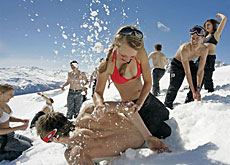
Swiss temperatures rise at twice the average

Temperatures in Switzerland have risen at twice the northern hemisphere average since the 1970s.
In particular, springs and summers have become significantly warmer, according to Swiss researchers, who are calling for urgent measures against global warming and its consequences.
A study by the Federal Institute for Forest, Snow and Landscape Research and the Federal Institute of Technology in Lausanne has shown that temperatures in Switzerland clearly rose during the 20th century, but since the 1970s the rise has been 0.57 degrees Celsius per decade – double the average in the northern hemisphere.
A main reason, according to study leader Martine Rebetez, is that Switzerland is far from the ocean, which absorbs a lot of energy from the atmosphere.
Also, Switzerland lies at a relatively high latitude. The researchers found that the nearer to the North Pole, the more the air temperature increases with global warming: the ice and snow reflects the sun much more than earth and trees.
Rebetez said all alpine countries were facing the same situation. Other northern hemisphere regions to have seen similar rises in temperature to those in Switzerland include northern Sweden, Ukraine and northern China.
Summer
Compared with previous decades springs and summers have become considerably warmer, with both seasons rising more than 0.8 degrees every decade.
This explains the earlier start of vegetation and the massive shrinking of alpine glaciers since the 1980s, said Rebetez.
The scientists admitted there were many causes of deglaciation, but the temperature in summer was the determining factor.
Why winters have not similarly become warmer since the 1970s has yet to be researched.
Consequences
The researchers explained that the rise in temperature was as though the altitude had been lowered by 300 metres, i.e. the altitude at 2,000 metres is now experiencing 1,700 metre temperatures.
This has an effect on not only glaciers and vegetation but also on agriculture, tourism, energy use, the permafrost and health. An increase in the number of extreme weather events such as mudslides, rockfalls and floods also has a serious effect on people’s safety.
For that reason the scientists said measures are urgently required to contain the risks and reduce the emission of greenhouse gases.
The data for the study, published in the latest edition of Theoretical and Applied Climatology, was gathered from 12 weather stations situated all over Switzerland at altitudes of 316-2,490 metres.
swissinfo with agencies
There are about 1,800 glaciers in the Swiss Alps.
Last year 84 of the 91 glaciers under observation receded.
During the hot summer of 2003 between 5-10% of the glacier surface melted.
Between 1850 and 1975 the major glaciers lost half their mass.
It’s believed temperatures in Switzerland will rise by 2 degrees Celsius in winter and 3°C in summer within the next 50 years.
Tourism was one of the subjects of March’s Advisory Body on Climate Change (OcCC) report on the effects of rising temperatures on Switzerland by 2050.
It said lakesides and alpine destinations could become more attractive when summers become hotter, but the lack of snow could spell the end of low-lying ski areas.
It also predicted that access to alpine resorts could become more difficult due to extreme weather.
The lack of snow and melting glaciers would have an impact on resorts’ attractiveness. The thawing of permafrost would affect ski stations and lifts that are anchored in the mountainside and there could be more landslides and rock falls.

In compliance with the JTI standards
More: SWI swissinfo.ch certified by the Journalism Trust Initiative





























You can find an overview of ongoing debates with our journalists here . Please join us!
If you want to start a conversation about a topic raised in this article or want to report factual errors, email us at english@swissinfo.ch.